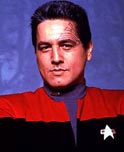The SF Debris video noted in
Review of Voyager: Tattoo also pointed out the dubious source of the Chakotay character:
ChakotayIn developing Chakotay, the producers sought the assistance of Jamake Highwater, a writer of more than 25 books of both fiction and non-fiction related to Native American myths and traditions. Highwater was a controversial choice of advisor, having been exposed by Hank Adams and Vine Deloria, Jr. as taking a fake Native American ancestry in order to sell books. Around September 21, 1993, Highwater gave seven pages of notes to producers regarding Chakotay's backstory but his tribal ancestry was unresolved. By the end of that month, Michael Piller drafted the first version of the writer's bible for the series in which the character was named "Chakotoy." By the time Piller wrote the first draft of the story that eventually became the Voyager pilot "Caretaker," the character was known as "Chakotay" and been made a Sioux. By the third draft of the story, submitted at the start of November, he had become a Hopi, but by the following February he once again had no tribal affiliation.Jamake HighwaterJamake Highwater, also known as Jay Marks and Gregory J. Markopoulos (ca. 1942–June 3, 2001) was an American writer and journalist. He was the author of over 30 fiction and non-fiction books of music, art, poetry and history, including the children's novel Anpao: An American Indian Odyssey (1973), which received a Newbery Honor, and The Primal Mind: Vision and Reality in Indian America (1981) which was also made into a documentary. Highwater assumed a false American Indian identity in the 1960s, which had been exposed by the mid-1980s, although confusion about his life remains widespread.Comment: I read
The Primal Mind long ago, before I knew Highwater was a fake. As with the work of
Ward Churchill, another fake, I think
Primal Mind had some good points. As I vaguely recall, it presented a believable picture of the so-called indigenous or primal mentality.
But I suspect it was heavy on the New Age belief that Natives are more spiritual and in touch with nature. It would've made Chakotay a novelty in 1940s and 1950s, when most Hollywood Indians were violent savages. But in the 1980s and 1990s, practically every Hollywood Indian was spiritual and in touch with nature. At that point, Chakotay wasn't much except a tired cliché.
For more on the subject, see
Star Trek Voyager: Chakotay.



I think Roy Zimmerman said it best in song:
ReplyDeletehttps://www.youtube.com/watch?v=f3qgiNPVpSM
I knew he was up to no good
ReplyDeleteI suppose they could have created a fictional post WW3 Startrek Era native american culture that amalgamated remnant culture from diverse peoples.
ReplyDelete